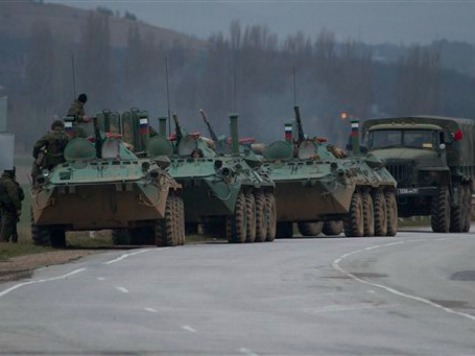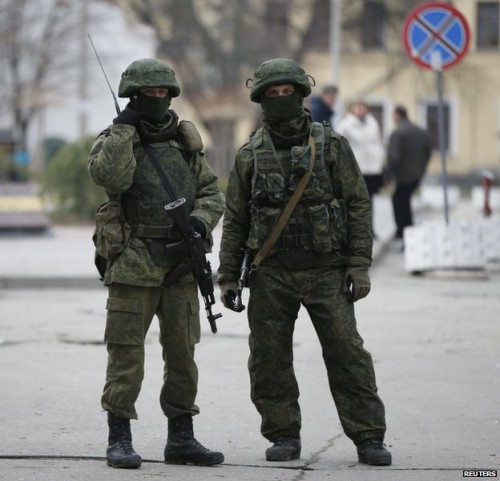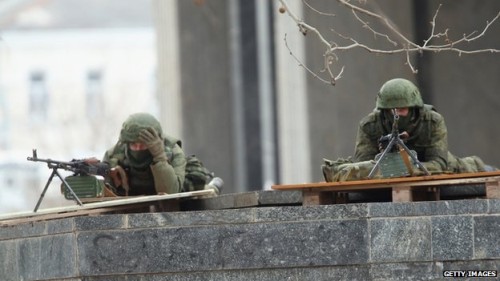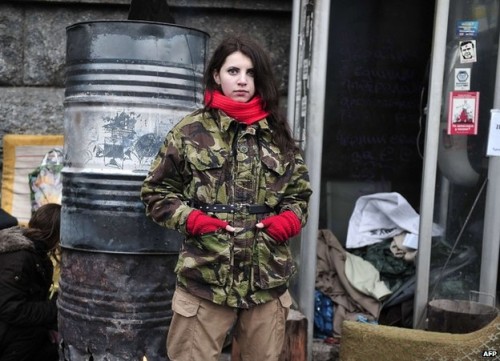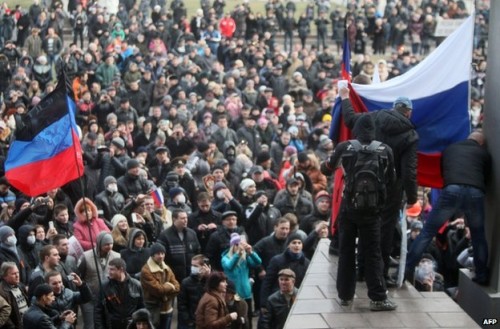The following news article by the BBC describes the uncertain situation in Ukraine after last week’s coup d’état fomented by EU and US agent provocateurs since last November when protests began in Kiev. The democratically and constitutionally elected president Yankukovych was ousted and replaced by an “interim government” which is in reality “de facto,” one that is being supported by a puppet parliament. The BBC's empty claim that Russia must now deal with these "authorities" in the Ukraine, does not change the fact that those now posing as an "interim government" in Kiev were not democratically elected and are illegally taking decisions to ally the country with the EU - without consulting the voters. Elections may have been called for May 25th but it is difficult to see how reliable elections could be held in a country in such political turmoil where the country is divided by neo Nazi groups and a huge majority supports continued links with Moscow. Ukraine could be divided with the Nazi-controlled part allying itself with Europe and the remainder where Russian is spoken, falling into the Russian camp. From one point of view this is good news for Russia as it would not have to deal with a Nazi-run regime and then would be the EU’s problem and a huge ironical problem for Germany after the extensive denazification process that took place after 1945. In the face of US demands and threats against Russian military intervention in Ukraine, President Putin has chosen his time to nip the Ukrainian destabilization plan in the bud by readying some 150,000 additional troops that will soon be sent to Ukraine. Here's a video report of the decision by President Putin and the Russian Parliament along with the reaction by Barack Obama: In today's article, the BBC also claims that Russia's move is a "provocation" knowing full well that it has been the US and EU who have brought about the destabilization of Ukraine over the last 4 months. Meanwhile, Obama's audacious statement, warning Russia not to intervene is rich in hypocrisy:
US threats mean little when the victim of these menaces also has a huge thermonuclear arsenal. These troops being prepared in Russia will be in addition to Russia's Black Sea Fleet located in Sevastolpol, Crimea. The Black Sea Fleet carries about 6,000 troops which includes:
Clearly, Russia is not Panama, Grenada, Honduras, Paraguay, Iraq, Libya or Afghanistan. It appears that President Putin will not allow NATO and the US to establish a political or military beachhead on Ukrainian territory and effectively isolate the Russian Black Sea fleet which has always been based in the Crimea. Our suspicion is that pro-Russian Crimea could declare itself an independent republic under Russian protection if the situation in Ukraine is not normalized or if it splits into two countries. We also suspect that Mr Putin wants to keep NATO and the US out of his “back yard” just a Mr Obama wants to keep Russia at arm’s length and well away from its own “back yard” in Central and South America after rumors were rife that Russia may establish military bases in Cuba and Venezuela, rumors that have been denied by Venezuelan Foreign Minister Elias Jaua. We await further developments. Arturo Rosales is a political analyist and essayist writing from Venezuela. - Arturo Rosales Axis of Logic March 1, 2014 BBC Russian parliament approves troop deployment in Ukraine The BBC's Daniel Sandford says "what appear to be Russian troops" are standing guard at local government offices in Simferopol Russia's upper house of parliament has approved President Putin's request for Russian forces to be used in Ukraine. He had asked that Russian forces be used "until the normalisation of the political situation in the country". Russia's Black Sea Fleet is based in the Ukrainian region of Crimea, where many ethnic Russians live. Kiev has reacted angrily to days of military movements in Crimea, accusing Moscow of trying to provoke the new government into an armed conflict. Interim President Olexander Turchynov has called an emergency session of his security chiefs. Russia's Vladimir Putin submitted the request for troops "in connection with the extraordinary situation in Ukraine and the threat to the lives of Russian citizens", the Kremlin said. The BBC's Richard Galpin in Moscow says it is potentially significant that the request was for deployment in Ukraine as a whole, and not specifically for flash-points such as Crimea. The upper house went into a special session almost immediately after Mr Putin made the request, in what seems to have been a carefully co-ordinated series of events during the day Earlier, the lower house of parliament had urged the president to take whatever measures were necessary to "stabilise" the situation in Crimea. During the upper house debate, one legislator accused US President Barack Obama of crossing "a red line" with his comments that there would be costs if Russia intervened militarily in Ukraine. The upper house has recommended that the Russian ambassador the US should be recalled, although the decision lies with Mr Putin. 'Provocation' The request follow days of military activity in Crimea during which unidentified armed men moved in to take over the regional parliament, state television and telecommunications hubs. Soldiers from Russia's Black Sea Fleet, which is based in Crimea, are reported to be guarding some administrative buildings and military bases. Amid the closure of airspace over Crimea's regional capital Simferopol on Friday evening, there were unconfirmed reports that Russian planes were flying in thousands of troops. Ukrainian Defence Minister Ihor Tenyukh said on Saturday there are now an extra 6,000 Russian troops in Crimea, alongside an additional 30 armoured vehicles.
Under the agreement governing the presence of the fleet in Crimea, the Russians must co-ordinate all troop movements outside the fleet's base with the Ukrainian authorities beforehand. The newly-elected pro-Moscow leader of Crimea, Sergiy Aksyonov, earlier said he had appealed to Mr Putin for help to ensure peace on the peninsula - a request which the Kremlin said it would "not leave unnoticed". Events in Crimea have angered the new interim government in Kiev - which does not recognise the province's new leadership - and has alarmed Western leaders. President Turchynov accused Russia of trying to provoke Kiev into "armed conflict", but said they would not react. US President Barack Obama said on Friday that "any violation of Ukraine sovereignty... would be deeply destabilising". He warned of the "costs" of any Russian intervention in the Ukraine and commended the interim government in Kiev for its "restraint". Meanwhile, big pro-Russian rallies are being held in several Ukrainian cities outside Crimea. In Donetsk, Mr Yanukovych's traditional stronghold, demonstrators from a crowd of some 7,000 tried unsuccessfully to occupy the regional administration building, raising a Russian tricolour on a nearby flag-post In Kharkiv, Ukraine's second-biggest city, scuffles broke out when protesters with Russian flags tried to occupy the regional administration building In Mariupol, in the south-east, hundreds of protesters carrying Russian flags gathered outside the city council in eastern and southern Ukraine. Source: BBC |
